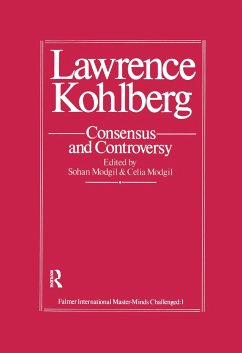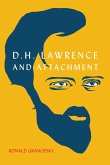- Broschiertes Buch
- Merkliste
- Auf die Merkliste
- Bewerten Bewerten
- Teilen
- Produkt teilen
- Produkterinnerung
- Produkterinnerung
First Published in 1986. Routledge is an imprint of Taylor & Francis, an informa company.
Andere Kunden interessierten sich auch für
![La educación moral según Lawrence Kohlberg La educación moral según Lawrence Kohlberg]() Lawrence KohlbergLa educación moral según Lawrence Kohlberg38,99 €
Lawrence KohlbergLa educación moral según Lawrence Kohlberg38,99 €![Policing and the Legacy of Lawrence Policing and the Legacy of Lawrence]() Policing and the Legacy of Lawrence49,99 €
Policing and the Legacy of Lawrence49,99 €![Evidence-Based Crime Prevention Evidence-Based Crime Prevention]() David Farrington / Brandon C. Welsh (eds.)Evidence-Based Crime Prevention114,99 €
David Farrington / Brandon C. Welsh (eds.)Evidence-Based Crime Prevention114,99 €![The Poems of Alexander Lawrence Posey The Poems of Alexander Lawrence Posey]() Alexander Lawrence PoseyThe Poems of Alexander Lawrence Posey16,99 €
Alexander Lawrence PoseyThe Poems of Alexander Lawrence Posey16,99 €![Following Kohlberg Following Kohlberg]() Donald R.C. ReedFollowing Kohlberg122,99 €
Donald R.C. ReedFollowing Kohlberg122,99 €![D.H. Lawrence and Attachment D.H. Lawrence and Attachment]() Ronald GranofskyD.H. Lawrence and Attachment38,99 €
Ronald GranofskyD.H. Lawrence and Attachment38,99 €![Archaeological Research Archaeological Research]() Peter Peregrine (Lawrence University)Archaeological Research59,99 €
Peter Peregrine (Lawrence University)Archaeological Research59,99 €-
-
-
First Published in 1986. Routledge is an imprint of Taylor & Francis, an informa company.
Hinweis: Dieser Artikel kann nur an eine deutsche Lieferadresse ausgeliefert werden.
Hinweis: Dieser Artikel kann nur an eine deutsche Lieferadresse ausgeliefert werden.
Produktdetails
- Produktdetails
- Verlag: Taylor & Francis Ltd
- Seitenzahl: 580
- Erscheinungstermin: 10. August 2016
- Englisch
- Abmessung: 175mm x 247mm x 34mm
- Gewicht: 1006g
- ISBN-13: 9781138979512
- ISBN-10: 1138979511
- Artikelnr.: 57043892
- Herstellerkennzeichnung
- Produktsicherheitsverantwortliche/r
- Europaallee 1
- 36244 Bad Hersfeld
- gpsr@libri.de
- Verlag: Taylor & Francis Ltd
- Seitenzahl: 580
- Erscheinungstermin: 10. August 2016
- Englisch
- Abmessung: 175mm x 247mm x 34mm
- Gewicht: 1006g
- ISBN-13: 9781138979512
- ISBN-10: 1138979511
- Artikelnr.: 57043892
- Herstellerkennzeichnung
- Produktsicherheitsverantwortliche/r
- Europaallee 1
- 36244 Bad Hersfeld
- gpsr@libri.de
Edited By Sohan Mogdil Reader in Educational Research and Development Brighton Polytechnic and Celia Mogdil Senior Lecturer in Educational Psychology London University.
I INTRODUCTION 1. Lawrence Kohlberg: Consensus and Controversy II MORAL
PHILOSOPHY 2. Does Kohlberg Avoid Relativism? 3. A Psychologist among the
Philosophers: Philosophical Aspects of Kohlberg's Theories III INTERFACE
BETWEEN DEVELOPMENTAL PSYCHOLOGY AND MORAL PHILOSOPHY 4. The Oughts of Is:
Kohlberg at the Interface between Moral Philosophy and Developmental
Psychology 5. On Using Psychology to Justify Judgments of Moral Adequacy IV
MORAL PSYCHOLOGY 6. Moral Autonomy and the Theory of Kohlberg 7. Kohlberg's
Moral Psychology: Any Advance on the Present Stage? V MORAL JUDGMENT AND
MORAL ACTION 8. The Relationship of Moral Judgment and Moral Action:
Kohlberg's Theory, Criticism and Revision 9. Why Act on Kohlberg's Moral
Judgments? (Or How to Reach Stage 6 and Remain a Bastard) VI MORAL
DEVELOPMENT AND EGO DEVELOPMENT 10. Kohlberg and the Psychology of Ego
Development: A Predominantly Positive Evaluation 11. On Kohlberg's
Contributions to Ego Development VII MORALITY, REASON AND EMOTIONS 12.
Kohlberg on Morality and Feeling 13. Morality, Reason and VIII MORAL
EDUCATION 14. First Steps in Moral Education: Understanding and Using
Reasons 15. Kohlberg's Stage Theory as a Progressive Educational Form for
Value Development IX MORAL CURRICULUM 16. Kohlbergian Programmes in Moral
Education: A Practical Review and Assessment 17. Kohlberg and the Hidden
Curriculum X RELIGIOUS EDUCATION 18. Religious Education 19. ME + RE ==
Kohlberg with a Difference XI SOCIALREASONING 20. Moral Judgment and the
Social Cognitive Developmental Research Programme 21. Social Reasoning XII
MORAL REASONING AND POLITICAL ISSUES 22. Kohlberg's Contribution to
Political Psychology: A Positive View 23. The Genesis of Moral Domination
XIII THEOLOGICAL EPISTEMOLOGY 24. Contributions of Kohlbergs Theory to
Theological Epistemology 25. Some Critical Adaptations for Judaeo-Christian
Communities XIV CROSS-CULTURAL MORALITY 26. Cross-Cultural Research on
Kohlberg's Stages: The Basis for Consensus 27. Moral Maturity in
Socio-Cultural Perspective: Are Kohlberg's Stages Universal? XV MORAL
RESEARCH METHODOLOGY 28. Moral Research Methodology 29. Kohlberg's Moral
Judgment Interview: Is There a Need for Additional Research? XVI CONCLUDING
CHAPTER 30. A Current Statement on Some Theoretical Issues
PHILOSOPHY 2. Does Kohlberg Avoid Relativism? 3. A Psychologist among the
Philosophers: Philosophical Aspects of Kohlberg's Theories III INTERFACE
BETWEEN DEVELOPMENTAL PSYCHOLOGY AND MORAL PHILOSOPHY 4. The Oughts of Is:
Kohlberg at the Interface between Moral Philosophy and Developmental
Psychology 5. On Using Psychology to Justify Judgments of Moral Adequacy IV
MORAL PSYCHOLOGY 6. Moral Autonomy and the Theory of Kohlberg 7. Kohlberg's
Moral Psychology: Any Advance on the Present Stage? V MORAL JUDGMENT AND
MORAL ACTION 8. The Relationship of Moral Judgment and Moral Action:
Kohlberg's Theory, Criticism and Revision 9. Why Act on Kohlberg's Moral
Judgments? (Or How to Reach Stage 6 and Remain a Bastard) VI MORAL
DEVELOPMENT AND EGO DEVELOPMENT 10. Kohlberg and the Psychology of Ego
Development: A Predominantly Positive Evaluation 11. On Kohlberg's
Contributions to Ego Development VII MORALITY, REASON AND EMOTIONS 12.
Kohlberg on Morality and Feeling 13. Morality, Reason and VIII MORAL
EDUCATION 14. First Steps in Moral Education: Understanding and Using
Reasons 15. Kohlberg's Stage Theory as a Progressive Educational Form for
Value Development IX MORAL CURRICULUM 16. Kohlbergian Programmes in Moral
Education: A Practical Review and Assessment 17. Kohlberg and the Hidden
Curriculum X RELIGIOUS EDUCATION 18. Religious Education 19. ME + RE ==
Kohlberg with a Difference XI SOCIALREASONING 20. Moral Judgment and the
Social Cognitive Developmental Research Programme 21. Social Reasoning XII
MORAL REASONING AND POLITICAL ISSUES 22. Kohlberg's Contribution to
Political Psychology: A Positive View 23. The Genesis of Moral Domination
XIII THEOLOGICAL EPISTEMOLOGY 24. Contributions of Kohlbergs Theory to
Theological Epistemology 25. Some Critical Adaptations for Judaeo-Christian
Communities XIV CROSS-CULTURAL MORALITY 26. Cross-Cultural Research on
Kohlberg's Stages: The Basis for Consensus 27. Moral Maturity in
Socio-Cultural Perspective: Are Kohlberg's Stages Universal? XV MORAL
RESEARCH METHODOLOGY 28. Moral Research Methodology 29. Kohlberg's Moral
Judgment Interview: Is There a Need for Additional Research? XVI CONCLUDING
CHAPTER 30. A Current Statement on Some Theoretical Issues
I INTRODUCTION 1. Lawrence Kohlberg: Consensus and Controversy II MORAL
PHILOSOPHY 2. Does Kohlberg Avoid Relativism? 3. A Psychologist among the
Philosophers: Philosophical Aspects of Kohlberg's Theories III INTERFACE
BETWEEN DEVELOPMENTAL PSYCHOLOGY AND MORAL PHILOSOPHY 4. The Oughts of Is:
Kohlberg at the Interface between Moral Philosophy and Developmental
Psychology 5. On Using Psychology to Justify Judgments of Moral Adequacy IV
MORAL PSYCHOLOGY 6. Moral Autonomy and the Theory of Kohlberg 7. Kohlberg's
Moral Psychology: Any Advance on the Present Stage? V MORAL JUDGMENT AND
MORAL ACTION 8. The Relationship of Moral Judgment and Moral Action:
Kohlberg's Theory, Criticism and Revision 9. Why Act on Kohlberg's Moral
Judgments? (Or How to Reach Stage 6 and Remain a Bastard) VI MORAL
DEVELOPMENT AND EGO DEVELOPMENT 10. Kohlberg and the Psychology of Ego
Development: A Predominantly Positive Evaluation 11. On Kohlberg's
Contributions to Ego Development VII MORALITY, REASON AND EMOTIONS 12.
Kohlberg on Morality and Feeling 13. Morality, Reason and VIII MORAL
EDUCATION 14. First Steps in Moral Education: Understanding and Using
Reasons 15. Kohlberg's Stage Theory as a Progressive Educational Form for
Value Development IX MORAL CURRICULUM 16. Kohlbergian Programmes in Moral
Education: A Practical Review and Assessment 17. Kohlberg and the Hidden
Curriculum X RELIGIOUS EDUCATION 18. Religious Education 19. ME + RE ==
Kohlberg with a Difference XI SOCIALREASONING 20. Moral Judgment and the
Social Cognitive Developmental Research Programme 21. Social Reasoning XII
MORAL REASONING AND POLITICAL ISSUES 22. Kohlberg's Contribution to
Political Psychology: A Positive View 23. The Genesis of Moral Domination
XIII THEOLOGICAL EPISTEMOLOGY 24. Contributions of Kohlbergs Theory to
Theological Epistemology 25. Some Critical Adaptations for Judaeo-Christian
Communities XIV CROSS-CULTURAL MORALITY 26. Cross-Cultural Research on
Kohlberg's Stages: The Basis for Consensus 27. Moral Maturity in
Socio-Cultural Perspective: Are Kohlberg's Stages Universal? XV MORAL
RESEARCH METHODOLOGY 28. Moral Research Methodology 29. Kohlberg's Moral
Judgment Interview: Is There a Need for Additional Research? XVI CONCLUDING
CHAPTER 30. A Current Statement on Some Theoretical Issues
PHILOSOPHY 2. Does Kohlberg Avoid Relativism? 3. A Psychologist among the
Philosophers: Philosophical Aspects of Kohlberg's Theories III INTERFACE
BETWEEN DEVELOPMENTAL PSYCHOLOGY AND MORAL PHILOSOPHY 4. The Oughts of Is:
Kohlberg at the Interface between Moral Philosophy and Developmental
Psychology 5. On Using Psychology to Justify Judgments of Moral Adequacy IV
MORAL PSYCHOLOGY 6. Moral Autonomy and the Theory of Kohlberg 7. Kohlberg's
Moral Psychology: Any Advance on the Present Stage? V MORAL JUDGMENT AND
MORAL ACTION 8. The Relationship of Moral Judgment and Moral Action:
Kohlberg's Theory, Criticism and Revision 9. Why Act on Kohlberg's Moral
Judgments? (Or How to Reach Stage 6 and Remain a Bastard) VI MORAL
DEVELOPMENT AND EGO DEVELOPMENT 10. Kohlberg and the Psychology of Ego
Development: A Predominantly Positive Evaluation 11. On Kohlberg's
Contributions to Ego Development VII MORALITY, REASON AND EMOTIONS 12.
Kohlberg on Morality and Feeling 13. Morality, Reason and VIII MORAL
EDUCATION 14. First Steps in Moral Education: Understanding and Using
Reasons 15. Kohlberg's Stage Theory as a Progressive Educational Form for
Value Development IX MORAL CURRICULUM 16. Kohlbergian Programmes in Moral
Education: A Practical Review and Assessment 17. Kohlberg and the Hidden
Curriculum X RELIGIOUS EDUCATION 18. Religious Education 19. ME + RE ==
Kohlberg with a Difference XI SOCIALREASONING 20. Moral Judgment and the
Social Cognitive Developmental Research Programme 21. Social Reasoning XII
MORAL REASONING AND POLITICAL ISSUES 22. Kohlberg's Contribution to
Political Psychology: A Positive View 23. The Genesis of Moral Domination
XIII THEOLOGICAL EPISTEMOLOGY 24. Contributions of Kohlbergs Theory to
Theological Epistemology 25. Some Critical Adaptations for Judaeo-Christian
Communities XIV CROSS-CULTURAL MORALITY 26. Cross-Cultural Research on
Kohlberg's Stages: The Basis for Consensus 27. Moral Maturity in
Socio-Cultural Perspective: Are Kohlberg's Stages Universal? XV MORAL
RESEARCH METHODOLOGY 28. Moral Research Methodology 29. Kohlberg's Moral
Judgment Interview: Is There a Need for Additional Research? XVI CONCLUDING
CHAPTER 30. A Current Statement on Some Theoretical Issues








